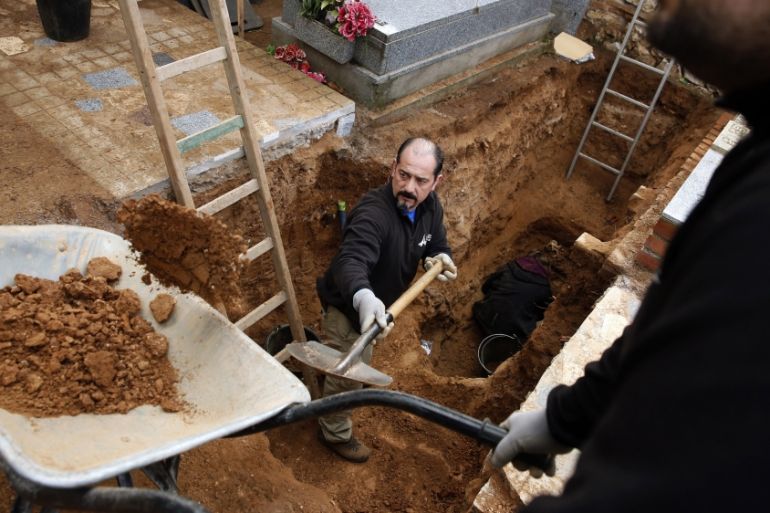Old wounds open as Franco’s mass graves loom over Spain’s vote
Efforts to identify Franco’s victims have become a hot-button election issue as far right ascends.

Madrid, Spain – As Spain prepares to vote in national elections on Sunday, old wounds have come to the forefront of the campaign season.
The question of Spain’s treatment of its dictatorial past, and its causalities, has become a hot-button election issue, thanks to a rising far-right.
The remains of 40,000 Spaniards who died in the country’s civil war, which lasted from 1936 to 1939, rest at an imposing memorial near Madrid called The Valley of the Fallen.
Spain’s former fascist leader Francisco Franco, whose repressive government ruled from 1939 until 1975 and was responsible for the deaths of thousands of political opponents, is also interred there.
Franco ordered the construction of the imposing monument – allegedly aided by forced labour – after his civil war victory.
The monument features a Catholic Basilica carved into a hillside and a 150-metre-tall cross which sits above it, visible from 32 kilometres.
The leader of the centre-left Socialist Workers’ Party of Spain (PSOE), Prime Minister Pedro Sanchez, has called for Franco’s remains to be removed from the monument, which belongs to the Spanish state.
Sanchez also attempted to include 15 million euros (nearly $17m) to identify Franco’s victims in a budget that failed to pass in February, which led to snap polls.
The far-right Vox party, which has seen surprising gains in regional elections and is projected to take roughly 12 percent of the vote, said it would block plans to exhume Franco and the thousands of mass graves for which his forces were responsible.
When Vox helped mainstream the centre-right People’s Party (PP) wrest control of Andalucia from PSOE, it was partly on the condition they negate laws which allow the exhumation of mass graves.
Forgetting traumatic events does not help to overcome them ...
For Mauricio Cela, a waiter in his sixties who works at a traditional restaurant in Madrid’s centre, the issue is complicated.
“My family believes my grandfather is [in] one of those graves,” Cela told Al Jazeera.
Cela said he considers himself conservative, but he would like to know his ancestor’s resting place. He had hoped his family would get the chance to do so, even if PSOE-allocated funds were responsible.
“It’s not a political thing, it’s personal. I want to vote for the right, but I don’t know if I want to give up this opportunity.”
Historical memory
The PSOE-headed government that ruled Spain from 2004 until 2011 passed the law of Historical Memory in 2007, which condemned atrocities under Franco, called for symbols of his rule to be removed from public spaces and claimed that the state would help in locating and identifying those still missing as a result of the civil war and Francoist oppression.
The law did away with the “pact of forgetting” made between PP, PSOE and the Spanish communist party after Franco’s death that had governed Spain’s stance towards its history.
There is no official count of the people killed or disappeared during the civil war, but estimates exceed 100,000.
Experts say there are over 3,000 mass graves across Spanish territory. Roughly 740 of these have been exhumed since 2000, leaving about 114,000 bodies in 2,500 more graves.
Still, many view the law as “too little, too late”, according to Heather Graham, an historian who specialises in the Spanish Civil War and its aftermath and is also a history professor at Royal Holloway, University of London.
The law “putatively gave rights to victims, it did so in such a way as (often) to block their enquiries because it also gave absolute protection” to perpetrators, Graham said.
Furthermore, the law was hobbled by not explicitly providing funding for the efforts to identify and exhume victims.
No money was allocated to these efforts by PP, which ruled from 2011 to 2018.
Graham stressed that the movement to exhume mass graves originated in civil society at the beginning of the 21st century, which pressured the national government to confront Spain’s past.
“It remains very much the exception rather than the norm for [a government] anywhere to deal with their own ‘difficult pasts’ in an open and honest way,” she said.
Regional trauma
Spain is home to four minority national identities and languages, including Basques, Catalans, Valencians and Gallegos. The majority group are known as Castilians, and their language is commonly known as Spanish.
The Franco government was known for its efforts to homogenise Spain. Catholicism was the only state-sanctioned religion and minority languages and culture were made illegal.
Catalonia bore the brunt of this oppression, with many of their leaders, including their regional president, Lluis Companys, being executed by Francoist firing squads.
Jordi Font Agullo, director of the Democratic Memorial, an institution inside the Department of Justice of the Government of Catalonia, said these wounds are still open for many Catalans: “For a great part of the Catalan society the memories of that historical period – civil war and dictatorship – are still alive.”
The region has attempted to attain independence in recent years, citing their unique culture and language, as well as continued discrimination from the Spanish state, as reasons for separating.
This perceived discrimination harkens back to Franco, Agullo said.
When asked about this election season’s policy proposals of a return to willful ignorance towards Franco’s policies, Agullo said he thinks it’s “a serious mistake” not to confront the past with all its complexity.
“Forgetting traumatic events does not help to overcome them, but [entrenches] them and [fosters] phenomena such as negationism and historical manipulation. A mature society must be capable of a critical and rigorous reading of its immediate past,” he concluded.